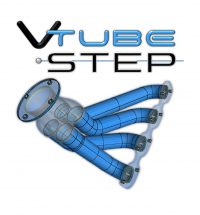Difference between revisions of "Importing a .STP File"
From ATTWiki
(→STEP 6) |
(→Steps to import a .stp file into VTube-STEP) |
||
| Line 24: | Line 24: | ||
<td width=300> | <td width=300> | ||
===STEP 1=== | ===STEP 1=== | ||
| − | Make sure VTube-STEP is cleared. </td> | + | Make sure VTube-STEP is cleared. |
| + | </td> | ||
<td> | <td> | ||
| + | [[image:vtube-v4 CLEARED.png|400px]] | ||
</td> | </td> | ||
</tr> | </tr> | ||
Revision as of 20:52, 16 February 2023
|
This document shows the process of importing a STEP file into VTube-STEP
The files used are .stp files.
Steps to import a .stp file into VTube-STEP
STEP 1Make sure VTube-STEP is cleared. |
|
STEP 2Under Import/Export, import a STEP File-STP. |
|
STEP 3Load the desired part into VTube-STEP from the file it is saved in inside file explorer |
|
STEP 4To collect parametric data, an operator can either autobuild or manually collect features. For Autobuild For Manual Collection |
STEP 5Rebuild Parametric Tube from Collected | |
STEP 6The XYZ and LRA grid will now have parametric data in them. This information can be sent to a bender, or brought into VTube-LASER to be measured against. |
|
STEP 7Save the .CHS file to the same thumb drive, remove it and take it back to the bender |
|
STEP 8Load the file in the bender and bend the part. Make sure to double check the data in VTube-STEP matches the data in the bender. |
Other Pages
- Back to the VTube-STEP page









